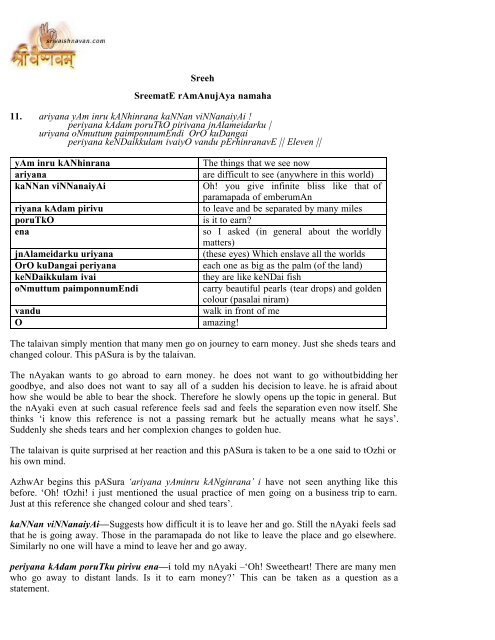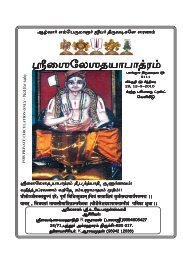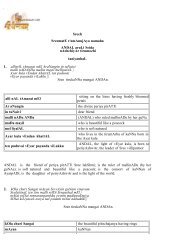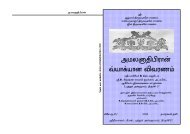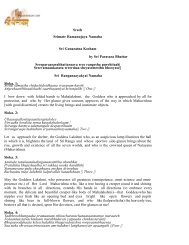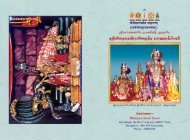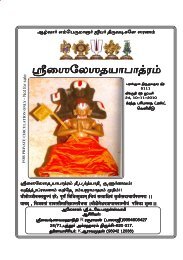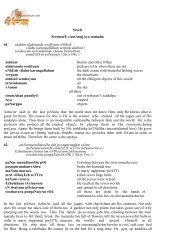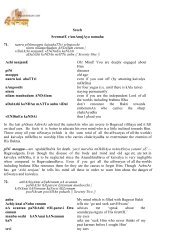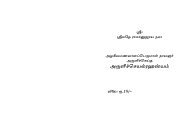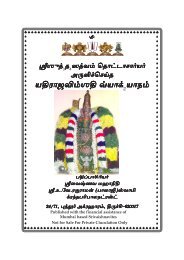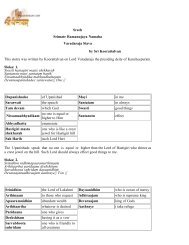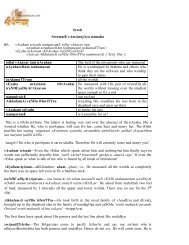Tiruviruttam2 - Srivaishnavan
Tiruviruttam2 - Srivaishnavan
Tiruviruttam2 - Srivaishnavan
Create successful ePaper yourself
Turn your PDF publications into a flip-book with our unique Google optimized e-Paper software.
SreehSreematE rAmAnujAya namaha11. ariyana yAm inru kANhinrana kaNNan viNNanaiyAi !periyana kAdam poruTkO pirivana jnAlameidarku |uriyana oNmuttum paimponnumEndi OrO kuDangaiperiyana keNDaikkulam ivaiyO vandu pErhinranavE || Eleven ||yAm inru kANhinranaariyanakaNNan viNNanaiyAiriyana kAdam pirivuporuTkOenajnAlameidarku uriyanaOrO kuDangai periyanakeNDaikkulam ivaioNmuttum paimponnumEndivanduOThe things that we see noware difficult to see (anywhere in this world)Oh! you give infinite bliss like that ofparamapada of emberumAnto leave and be separated by many milesis it to earn?so I asked (in general about the worldlymatters)(these eyes) Which enslave all the worldseach one as big as the palm (of the land)they are like keNDai fishcarry beautiful pearls (tear drops) and goldencolour (pasalai niram)walk in front of meamazing!The talaivan simply mention that many men go on journey to earn money. Just she sheds tears andchanged colour. This pASura is by the talaivan.The nAyakan wants to go abroad to earn money. he does not want to go withoutbidding hergoodbye, and also does not want to say all of a sudden his decision to leave. he is afraid abouthow she would be able to bear the shock. Therefore he slowly opens up the topic in general. Butthe nAyaki even at such casual reference feels sad and feels the separation even now itself. Shethinks ‘i know this reference is not a passing remark but he actually means what he says’.Suddenly she sheds tears and her complexion changes to golden hue.The talaivan is quite surprised at her reaction and this pASura is taken to be a one said to tOzhi orhis own mind.AzhwAr begins this pASura ‘ariyana yAminru kANginrana’ i have not seen anything like thisbefore. ‘Oh! tOzhi! i just mentioned the usual practice of men going on a business trip to earn.Just at this reference she changed colour and shed tears’.kaNNan viNNanaiyAi—Suggests how difficult it is to leave her and go. Still the nAyaki feels sadthat he is going away. Those in the paramapada do not like to leave the place and go elsewhere.Similarly no one will have a mind to leave her and go away.periyana kAdam poruTku pirivu ena—i told my nAyaki –‘Oh! Sweetheart! There are many menwho go away to distant lands. Is it to earn money?’ This can be taken as a question as astatement.
jnAlam eidarkuriyana—Desired by all the people (or) world is the price.ON muttum paimponnum Endi—‘pon kulAm payalai poottana mentOL’ tirumangai AzhwAr.‘ooruN KENi uNDurai tokka pASiyaTTrE pasalai, kAdalar toDuvuzhi toDuvuzhi neengiviDuvuzhi viDuvuzhi parattalAnE’—krurundohai. As the kAdalan touches (toDuvuzhi) as he takesaway his hand (viDuvuzhi) pASiyaTTrE—the moss. The tears are pearl like; the pasalai is calledpon.keNDaikkulam pOnra kaNgaL—Cool, shining and always moving. Hence the eyes arecompared to keNDai meen.ivaiyO—As i mentioned about the general practice of men going out to earn her fish like eyesshed pearl like tears and her skin became ‘gold’ (pasalai) as if to say ‘why should you go out toearn? Here are the precious pearls and the gold. They are yours (ON muttum paimponnum Endi).swApadESArtha—The BAgavatas asked AzhwAr’s permission to go to diyva dESas. AzhwAr isreluctant to permit them. ariyana yAm inru kANginrana—This AzhwAr’s jnAna is extraordinaryand is not seen anywhere.kaNNan viNNanaiyAi—AzhwAr’s company gives andamil Ananda (infinite biss) and hissambandha cuts off our prakrti sambandha; his nature is always the same, never varies—all theseare the characteristics of paramapada and AzhwAr.periyana kAdam poruTkO pirivana—As we said we are going to far away divyadESas toworship Him. The paramporuL .jnAlam eidarkuriyana—To experience all the worlds (or) capable of enslaving all the SreevaiShNavas—jnAlam is taken to mean people which in turn refers to Sree vaiShNavas. ‘ulahamenbadu uyarndOr mATTE’.ON muttum paimponnum Endi—AzhwAr has Suddha satva guNa (ON muttu) and effulgentform like gold (paimponnum) OrO kuDangai periyana—are as easy as can be held in the palmof a hand.keNDaikkulam—Whose mind is engrossed in the matsyAvatAra. ivai—The variety of jnAna(the degrees of jnAna)vandu pErhinrana—Coming near us make us desire Him more ‘piriyavoNNAdapaDi AsaiyaimooTTuhinrara’.O—How wonderful.AzhwAr fears the separation from Sree vaiShNavas who want to leave him and go to divyadESas. he is very much worried as they mention the topic.12. pErhinradu maNimAmai pirangiyaLLarpayalaioorhinradu kangul oozhihaLE idellAm inavE |eerhinra chakkarattemberumAn kaNNan taNNanduzhAisArhinra nanenjinAr tandu pOna tanivaLamE || Twelve ||maNimAmaipErhinradupirangiyaLLarpayalaioorhinraduMy beautiful complexionhas changedthe thick ‘pasalai niram’increases
kanguloozhihaLEidellAm inavEeerhinra chakkarattuemberumAn kaNNantaN amtuzhAisArhinra nanenjinArtandu pOnatanivaLamEthe nightextend like yugasall these and other things (like tenral, moonetc)the chakrAyudha that cut the enemieskaNNa pirAn, my talaivancool beautiful tuzhasimy good mind that desireshe gives (as he went away)is my excellent aiSwarya.As the nAyaka went away the nAyaki pours her mind out to her tOzhi (or) speaks to her mind.mAmai—The healthy beautiful complexion of a young girl. She calls her complexion ‘maNimAmai’. The nAyaka used to describes her so.pirangi aLLal payalai oorhinradu—The pasalai niram is spreading all over my body.kangul oozhihaLE—When i am with nAyaka the nights end in a second; when i am away fromHim they extend like yugas.idellAm inavE—All things like anril (a bird) tenral (breeze), tingaL (moon) etc torment me.eerhinra chakkarattu emberumAn—emberumAn who has tiruvAzhi (charka) that kills theASritavirOdhis (or) his beautiful form with chakrAyudha toments me. ‘piradikoolarai ANmaiyAlEkollum; anukoolarai azhahAlE kollum’—peiyavAchchAn piLLai.kaNNan tuzhAi sArhinra nenju—My mind thinks it is lucky to have the sambandha oftiruttuzhAi which has the sambandha of emberumAn. sArhinra—It simply jumps at the offerwithout any doubt whether it will get it or not. nal nenju—my mind which is my friend has gonebehind emberumAn leaving me.tandupOna tanivaLamE—She calls the change of her maNi mAmai, the lengthening of nights,the loss of her mind which went behind His tiruttuzhAi—as ‘vaLam’. This is called vipareetalakShaNa. To call a beggar as ‘rich man’ is an ironical expression. This is vipareeta lakShaNa.She calls herself as one possessed of much ‘aiSwarya’.AzhwAr had the darSan of emberumAn with his jnAnakkaN. But he could not have hissamslESha. Therefore he expresses his love in this pASura ‘emberumAn kaiyum tiruvAzhiyumAitOLum tOLmAlaiyumAi sEvai sAdikkira nilaimaiyilE sEvikka peravENumenru Asai paTTu adukiDaiyAmaiyAlE ‘oru pahal Ayiram oozhiyAlO ‘enru varundavum ‘sanguvil vAL taNDuchakkarakkaiyarku…kongalar taNNanduzhAi muDiyAnukku en mangai izhandadu mAmainiramE’ enru klESikkavum nErndadu’.13. tanivaLar sengOl naDAva tazhal vAyarasaviyapanivaLar sengOliruL veeTTrirundadu pArmuzhudum |tunivaLar kAdal tuzhAyai tuzhAvutaN vADaitaDinduinivaLai kAppavarAr enai yoozhihaLeervanavE || Thirteen ||tanivaLarsengOlnaDAvatazhal vAi arasuaviyapanivaLar sengOl iruLAlways increasinghis regionin all placesthe king called sun who is always hotto diethe king called night who causes shiver in all
pArmuzhudum veeTTrirundaduinitunivaLar kAdal tuzhAyaituzhAvutaN vADaitaDinduvaLai kAppavar AroozhihaLenaieervanapeoplewas ruling over the whole of earthnowi desire the tuzhasi mAla even though itcauses duhKa in methe cool breeze brushes past (the tuzhAi)punishis there anyone who can save my banglesfrom slipping down my hands (that havebecome thin due to separation)the nights which extend like yugasmesplit meThe nAyaki is sad because of her separation from the nAyaka. She curses the nights and thebreeze in this pASura.The indriyas are engaged in various activities during the day time. They keep quiet in the nightexcept the mind. The mind, however keeps thinking of the nAyaka alone as there is nothing elseto do. Therefore the thoughts of the lover reminds her of the samslESha with him and enhancesthe sorrow.When the emperors are powerful the kings and lords lie low. When he is gone, these small kingsand lord raises their heads and become powerful. Similarly when the sun is bright in the day thestars and the moon are not seen but as soon as he sets they reign over the earth. tazhal vAi—sun’s hot rays and his gloriesAzhwAr does not say ‘sooriyan maraiya’ but says ‘sooriya aviya’ to suggest the sun does notseem to rise at all, perhaps he is dead.sengOl means a just rule. But AzhwAr calls the rule of the night too as ‘sengOl’. It is vipareetalakShaNa. The just rule of the night is to kill all the separated lovers. pAr muzhudumveeTTrirundu—The ‘panivaLar sengOl irul’ spreads his power over all the areas of the earth i.e.,he has the whole earth under his control. There is no enemy to oppose him. he was all alongwaiting for the sun to set so that he can spread his rule everywhere.On one side the night tortures me and on the other the ‘tiruttuzhAi kATTru’ (the breeze thatbrushes past the tiruttuzhAi bringing the scent to her) also torments her. Is there no one who canpunish these fellows and save her?taN vADai—She calls the breeze ‘taN’ because it was once pleasing to her when she was withHim. She remembers how the breeze was a good friend once.taDindu—To cut. Is it possible to cut the breeze? nAyaki, however, says so out of her angertowards the breeze.ini—The nAyaka who should my rakShaka has left me. Now the night when very nature is totrouble the lovers has come to add to my woes.vaLai kAppavar Ar—i have lost my weight and become thin due to separation. The bangles donot stay in my hands. They slip away again and again. The reason for this is me becoming thin,the reason for which is his separation. If the bangles are to stay in my hands i should become fatwhich is possible if only he comes. Who will help me in this regard? enai oozhihaL eervana—The nights seem to split my body causing terrible pain. they never seem to end auguring the
morning.swApadESArtha—AzhwAr is separated from emberumAn. he is in sorrow, wants the help ofsomeone. he has lost his discrimination, become weak physically and mentally.tani vaLar sengOl naDAvu tazhalvAyarasu aviya—The matchless ever shining rays of the sunkill the darkness. Similarly the vivEka kills ajnAna. The vivEkajnAna is called tazhalvAi arasu.This vivEka defeats the matAntaras and therefore is very powerful. This alone makes one followthe commandments of BagavAn. AzhwAr loses this excellent vivEka because he is immersed indarkness due to the separation from emberumAn. panivaLar sengOl iruL veeTTrirundu—ThemOhAndhakAra that deludes the buddhi and causes duhKa has come to him. tuni vaLar kAdaltuzhAyai tuzhAvu taNvADai taDindu—When he is separated there are many worldly things likethe tuzhAi etc. that reminds Him.vaLai kAppavar Ar—Who will make me stand firm in my decision to worship Him alone and notto worship dEvatAntaras.vaLai—Bangles is the symbol of Bagavatsambandha in swApadESa and represents AzhwAr’sdAsatva buddhi.enai oozhihaL eervanavE—‘koovikkoLLum kALam innam kuruhAdO’—This delay is unbearable.When will it end?14. eervanavElum anjElum uyirmEl miLirndivaiyOpErvanavO valla deivanal vETkaNai pEroLiyE |sOrvana neelasuDar viDu mEniyammAn visumboortErvana deivamanneer kaNNO ichchezhungayalE || Fourteen ||eervanavElum yOam sElumivaiuyirmEl miLirndupErvanavO valladeivanal vElkaNaipEroLiyE sOrvananeelasuDar viDu mEni ammAnoor visumbutErvanaichchezhungayaldeivamanneer kaNNOLike the spear that split the enemieslike beautiful sEl fishthese (eyes)jump on me to enslave my lifedon’t leave the placethe god manmatha’s arrowsthey are as brightemberumAn whose form resembles brightsapphirehis place is paramapadaconsidered as equalthese fat fish-like (eyes)are they eyes of yours who is like goddessmOhini?This poetry is called ‘nalampArATTu’. The nAyaka describes the nAyaki. Here the description ison her beautiful eyes. Why should he describer her? 1. The nAyaka really loves her andenchanted by her beauty. 2. So that both of them can sustain life after separation (by the memoryof his words) 3. nAyaki gains confidence that he will not go away from her as he likes her somuch or even if he goes he will come back soon.eervana vElum—Sharp like a spear that kills the foes. Her eyes pierce and kill me’—says thenAyaka.am sElum—The eyes are normally compared to fish because of similarities like cool, bright,moving.
uyir mEl miLirndu ivaiyO pErvanavO alla—They are like arrows that fall on the lovers and takeaway their lives. They never miss the target. They not only kill the perishable body but alsoimperishable Atma too. (pErvanavO alla).deiva nal vETkaNai pEroLiyE sOrvana—what manmatha’s pancha bANas (5 arrows) can dothese two ‘arrows’ of my nAyaki do effortlessly. They cause change of complexion and constantremembrance of the beauty, words, deeds etc. Thus both the manmatha bANas and her eyesresemble in their act.neela suDar viDu mEni ammAn visumboor tErvana—The eyes resemble paramapada(visumboor) in that once you enter you don’t come out of it. These eyes not only enslave those inthe leela viBootis but also of those of nityaviBootis. visumboor tErvana—The eyes search fortheir equals in paramapada (or) they are sought after by those in paramapada ‘paramapadattilaLavukaDanda inbam anubavikkum nitya muktarAlum AsaippaTTu nADudarku tahundavai’.deivamanneera kaNNO—Without any change in pronounciation but the change of ‘nakAras’ intamizh can give two meanings, with one ‘nakAra’ it means divine nature, the other ‘nakAra’ givesthe meaning the eyes of goddess mOhini.swApadESArtha—This pASura is by the BAgavatas. They praise AzhwAr’s jnAna.eervana vElum anjElum—The sharp and clear jnAna defeats the matAntaras and pleases theSree vaiShNavas.uyir mEl miLirndu ivaiyO pErvanavO alla—This jnAna never fails to give poorNa anugraha toall the chEtanas.deiva nal vETkaNai pEroLiyE sOrvana—The jnAna is as soft as manmatha’s bANas; not at allharsh.neela suDar viDu mEni ammAn viSumboor tErvan—The aims of the jnAna is paramapada afterrenouncing the nityaviBooti. ‘iruL tarum mA jnAlattuL inippiravi yAn vENDEn’.ichchezhungayalE—his heart is fixed in emberumAn’s matsyAvatAra deivamanneera kaNNO.AzhwAr is lOkavilakShaNa and his jnAna is also lOka vilakShaNa (not ordinary).15. kayalO numakaNhaLenru kaLiruvinavi niTTreerayalOrariyilumeedenna vArttai kaDal kavarnda |puyalODu vAngoNDal vaNNan puna vEngaDattu emmODumpayalOvileer kollakAkkinra nALum palapalavE || Fifteen ||kaLiru vinavikayalO numakaNhaLenru niTTreerayalOrariyilumeedenna vArttaikaDal kavarndapuyalODu ulAmkoNDal vaNNanpuna vEngaDattukollakAkkinra nALum palapalaemmODum payalOv ileerEnquiring ‘did you see an elephant comingthis side?’but stood gazing at the eyes wondering ‘arethey fish’?let the others knowyour words are inappropriatethat which absorbed all the waters of theoceanslowly moving in the sky loaded with wateremberumAn, who is like rain cloudin tirumalai where there are many fieldswe have been guarding the fields for manydaysyou don’t have a portion of the field here.
This is a tOzhi pASura. The nAyaka comes to the field where the nAyaki and her tOzhi aresitting guarding the field. The tOzhi talks to the talaivan.The nAyaka comes to the field where she is with her tOzhi. he comes under the pretext of huntingand searching for the missing elephant.periyavAchchan piLLai—‘iyarkaiyilE kalandu pirinda talaimahan iraNDAm kooTTattukkAhapunattilE vandu kiTTakkaDavadAha kuri varaviTTuppOi kAlAtikramam pirandu pinbu angEsenru kiTTinavan ivarhaLai kaNDu kalangi asangata BAShaNam paNNa, avarhaLumattaikkoNDu, ivar varuvadAha pOnapaDikkum vandapaDikkum ippOdu ATTrAmai tOTTrapESuhira pEchchukkum oru SErtti kaNDilOm enru Sirittu koNDADuhirArhaL. ivantAnveeranAhaiyAlE, enrum Anai vETTaikku pOm pazhakkattAlE Anai vETTaiyai vinavikkoNDusellakkaDavadAha ninaikkirAn. piDiyai izhandadoru kaLiru tan ATTrAmaiyAlEamaNAnaippaTTu tiriyumApOlE ivarhaLai izhandu tAn ATTrAmaiyODE tirihirapaDiyaianyApadESattAlE AviShkarikkirAn’.The nAyaka had gAndharva vivAha with the nAyaki. Then he went away and was not seen formany days. The nAyaki and tOzhi go everyday to the field under the pretext of guarding it,waiting for his arrival, nAyaka pretending to search for an elephant comes to where they aresitting. The nAyaka feels she might be angry with him for the delay. he does not want tosuddenly start the topic of love without knowing her mood and intention. Therefore he speaks onsome unrelated subject matters such as ‘did you seen an elephant coming this way? Ah! your eyesare very beautiful’ From their reply he would know what is in her mind. This is called ‘vEzhamvinAdal’. In tirukkOvaiyAr it is described also as kalaimAn vinAdal, vazhi vinAdal, padivinAdal,peyar vinAdal etc. ‘vEzham vinAdal enbadu—kurai koora tuNiyA ninra talaimahan en kuraiinnadenru ivaLukku veLippaDa kooruvEnAyin ivaL marukkavum kooDumena uTkoNDu en kuraiinnadenru ivaL tAnE uNarumaLavum karanda mozhiyAl sila solli pin kuraiyuruvadE kAriyamenavETTai karudi senrAnAha avviruvarum irukka senru ninru tan kAdal tOnra ‘ivvidattoru madayAnai vara kaNDeerO’ ena vEzham vinAvAniTTral’—tirukkOvaiyAr urai.We can see such vinAdal even today like a man asking ‘teerttam kiDaikkuma?’ ‘ippOdu maNienna’ etc he starts conversation by asking some common question and finally come to the subjectmatter.The nAyaka started the topic by enquiring about a missing elephant switches the topic saying‘how beautiful are the eyes’. (kayalO num kaNgaL) he has been a slave of her beautiful eyes.The tOzhi now realizes how truly the talaivan loves the talaivi but says ‘eedenna vArttai’ sinceshe is afraid the people nearby may overhear them.kayalO numa kaNgaL enru kaLiru vinavi niTTreer—There are two meanings.1. kaLiru vinavi kayalO numa kangaL enru niTTreer—you wanted to ask about theelephant. Then why should you talk about her eyes? If anyone overhears you what will they thinkabout us? They will think we have some sambandha with you. And that will be end of your loveaffair. So stop such unrelated talks.2. kayalO numa kaNgaL enru kaLiru vinavi niTTreer, ayalOr ariyilum eedennavArttai—you said ‘numa kaNgaL kayalO?’ we were happy to hear this. They whyshould you talk about some unknown elephant? We thought your intention of cominghere is to see us. But i think we are mistaken. Perhaps you had come here in search ofelephant. Let the others too know about your love. What do we care? Why should you
hide the fact? eedenna vArttai—What sort of dialogue is this! you forget the verypurpose of coming here and talk about some stupid elephant! ayalOr—it is enough ifyou think you are hers and she is yours. All the others are strangers only (let us not bestrangers to each other).puna vEngaDattu emmODum payalO ileer—payal means one who has a share in the land. Donot stand here as if you have a share of this land. It is not proper.kollai kAkkinra nALum pala palavE—Oh! nAyaka! we have been guarding this ‘punam’ since along time. you come, stand here and talk to us which the others may think as if you have a sharein this land. Go away. The real meaning is—we come here daily since a long time under thepretext of guarding this field. Our real purpose is to meet you if you come here. All these daysyou never came—Only today you came and give us the pleasure of your company. Are you notinterested in our nAyaki?16. palapala oozhihaLAyiDum anriyOr nAzhihaiyaipalapalakooriTTa koorAyiDum kaNNan viNNanaiyAi |palapala nALanbar kooDilum neengilum yAmelidumpalapala soozhaluDaittu amma! vAzhiyippAyiruLE || Sixteen ||kaNNan viNNanaiyAiyou are very beloved like paramapada ofkaNNa pirAnpalapala oozhihaLAyiDumthe nights lengthen like yugas (whenseparated from nAyaka)anriand alsoOr nAzhihaiyai palapalakooriTTa same night when I am with my nAyakakoorAyiDumbecome so short as one fraction of anAzhihaianbarthe nAyakapalapala nAL kooDilumwhen i am with Him for many daysyAm melidumi become thus (since the kAla shrinks)(anbar palapala nAL) neengilum(if the nAyaka ) goes away (for many days)yAm melidumi become this (since the nights become long)(therefore)ippAyiruL this night timepalapala soozhal uDaittuis very competentamma!Alas!vAzhilong live!The nAyaki had samslESha and then vislESha. She tells her tOzhi how the nights without hispresence are painful to her. She tells her she wants only samslESha without any vislESha.This pASura is also interpreted as the nAyaki telling her tOzhi how she enjoyed the samslEShaand how the time passed as of a minute and the nights appeared as a fraction of a second.anbar neengil palapala oozhihaLAyiDum – When i am not with nAyaka the nights lengthen likemany yugas. This pASura is similar to the tiruvAimozhi pASura ‘oorellAm tunji’. anbar kooDilor nAzhihaiyai pala pala kooriTTa koorAyiDum—the nights become very short like a fraction ofa second if the nAyaka is near me. ‘apoorva nAnA rasa BAva nirBara prabaddhayA mugdhavidagdha leelayA kShaNANuvat kShipta parAdikAlayA praharSayantam mahiSheemmahABujam’—stOtra ratna of ALavandAr.Note the words ‘kShaNANuvat kShipta parAdikAlayA para’ is the life time of a brahma.parArdha is half the life period. ‘avidita gatayAmA rAtrirEva vyaramseed’—uttara rAma
charita. ‘kOzhi koovennumAl tOzhi nAn en seidEn Azhi vaNNar varum pozhudAyiTTru kOzhikoovennumAl’—tirumangai AzhwAr.anbar kooDilum neengilum yAmelidum—i am sad when i am with Him as the nights end upvery soon; i am sad when he is not with me as the nights lengthen like yugas. i know vislEShawill always follow samslESha. Since in one case the nights are very short and the other case theyare very long. i always felt the nights are long.ippAyiruL pala pala soozhuDaittu—i wonder at the ‘sAmarthya’ if these nights! They know howto shrink and also know how to lengthen. They do just the opposite of what i want.vAzhi—Long live the nights—a vipareeta lakShaNa.swApadESArtha—AzhwAr says the time is short when he is with the BAgavatas and long whenare away. ippAyiruL—That which causes mOhAndhakAra. kaNNan viNNanaiyAi—Ah!BAgavatas! you are like paramapada to me when there is no kAla tatva. amma vAzhi—Howastonishing is this kAla.17. iruLvirindAlanna mAneertirai koNDu vAzhiyarOiruLpirindAranbar tErvazhi tooral aravaNai mEl |iruL virineela karujnAyiru suDarkAlvadu pOliruLvirisOdi perumAnuraiyumerikaDalE || Seventeen ||iruL virineelam karu jnAyiru suDarkAlvadu pOliruLvirisOdi perumAnaravaNai mEluraiyumeri kaDalEvAzhiiruLvirindAlannamAneertirai koNDuiruLpirindAranbar tErvazhi tooral(Oh! Sea) you spit out the nightlike the dark sapphire like soorya maNDalasheds lighttirumAl who is dark and effulgenton the sEShaSayanadoes nityavAsaOh! The sea with lashing waveslong live you!like the night that spreads outwith the waves of dark waterdo not erase the marks of the chariot wheelsof my nAyaka who left me in the night.This pASuram is called ‘tErvazhitooral’. In tirukkOvaiyAr it is called ‘tErvazhi nOkki kaDalODukooral’. ‘uLLam uruhi rOmam silirppa uDaiyavan ATkoLLum avarilOr kooTTram tantAnkunikkum puliyoor viLLum parisu senrAr viyan tErvazhi tooral kaNDAi, puLLum tiraiyum porasangam Arkkum poru kaDalE’—tirukkOvaiyAr.The nAyaka had samslESha with the nAyaki in secret. he wanted to leave her and go before shewakes up and before the people come to know about their affair. Therefore he leaves her in thenight when she was sleeping. After she wakes up she finds him missing. She comes out to seewhether the chariot parked in front of the house is still there or gone. She finds thechariot hadgone leaving the wheel mark. She stands gazing at it, as the place is near the sea shore she tellsthe sea not to erase the marks, as her life depends on it’.Sree rAma leaves the palace and goes in a chariot to the vanavAsa. The people of ayOdhyafollow Him and refuse to obey his words to go back. In the early morning, when all of them arefast asleep, he leaves them and thoughtfully erases the wheel marks so that they will not find outhis place. ‘kaDalE! iruLil pirindavarAna anbaruDaiya tEr vazhiyai iruL virindArpOnra mA neertiraihaLai kaNDu (tooral) maraittiDAdE.vAzhiyarO—Oh! Sea! If you do what i say then i shall bless you long life.
perumAn aravaNaimEl—Oh! sea! your nAyaka (emberumAn) does nityavAsa (uraiyum) in you.(i.e. He lies in tiruppArkaDal on AdisESha) Hence you don’t know the agony of separation. Thatis why you are always happy with your lashing waves.iruL viri neela karu jnAyiru—emberumAn’s tirumEni is compared to the sun. But here thesoorya maNDala is described as dark and effulgent. This type of simile is called ‘aBootOpama’‘Or karu jnAyiru andamilla kadir parappi alarndadokkum ammAn’—tiruvAimozhi.nAyaki says ‘tirai koNDu vAzhiyarO tEr vazhi tooral’ she introduces the word ‘vAzhiyarO’ in themiddle of the sentence, not in the end. She hastens up to add the word since she wants to seek themercy of the sea before it erases the mark with its continuous waves.iruL pirindAr anbar—If the nAyaka had left her in the morning she would have had thesatisfaction of seeing him till he disappears. But he left her in the night and that too when she wasasleep. Now the only life-giving substance is this ‘tErvazhi’. She laments ‘why should he leaveme in the night which is the time the couple enjoy each other’.periyavAchchAn piLLai—‘pahalil pririndu pOnArAhil ATTrAmaiyAlE naDakka mATTAduozhihirapaDiyaiyum avar muhattil uNDAna kuLirttiyaiyum smitattaiyum kaNDu darittirukkalAm.avar tAmum pahalil pOhil ivaLai kaNDu vaittu kAl naDai tArAdu enru iruLilE pOnAr; engaNumpOnArum meeNDu vandu sErungAlattilE pOnAr; padArtta darSanangaLAlE AriyirukkavoNNAda kAlattilE pOnAr; sambOga kAlattilE pOnAr’.swApadESArtha—AzhwAr is feeling sad because the BAgavatas left Him. he wants to think ofthem constantly. For this purpose he requests the samsAra kaDal to help him by not interfering inthe thought.erikaDal—As the waves lash continuously, so too the waves of duhKas lash at us continuously inthe samsAra sAgara. ‘iruL virindAl anna mA sirai neer koNDu'. The samsAra kaDal too hasBagavat sambandha (as pArkaDal has) because it is his leelA viBooti.iruL pirindAr anbar tEr vazhi tooral—anbar—The BAgavatas;iruL pirindAr—Left the samsAra sAgara that causes mOhAndhakAra.tEr vazhi tooral—Do not erase their thought from my mind.vAzhi—If you do so i shall bless you.18. kaDalkoNDezhundadu vAnam avvAnattai anrisenrukaDal koNDozhinda adanAlidu kaNNan maNNum viNNum |kaDalkoNDezhunda akkAlangolO puyal kAlangolOkaDal koNDa kaNNeer aruvi seyyAnirkum kArihaiyE || Eighteen ||kaDal koNDa kaNNeer aruviseyyAnirkumkArihaiyEvAnamkaDal koNDu ezhundadukaDalanriavvAnattai senru koNDu ozhinda adanAlidukaNNan maNNum viNNum kaDal koNDuThe tears that is as big as the seayou shedOh! Beautiful nangAi!the skyabsorbed all the water of the seathat seagetting angry at the sky (that did so)went and occupied the spacethis has happenedis it that praLaya kAla? when the water
ezhunda akkAlam kolOpuyal kAlam kolOsubmerges both the earth and the sky whichare his propertiesoris it the rainy season? (i don’t know)nambiLLai and periyavAchchAn piLLai call this pASura ‘kAla mayakku’ (as the 7 th pASura).vAdikEsari azhahiya maNavALa jeeyar calls this ‘kArkAlam kaNDazhinda talaiviyin ATTrAmaikaNDu tOzhi irangal’.The nAyaka promised while leaving he would return before kAkAla (rainy season) but the seasonhas arrived not he. The tOzhi pacifies her.nambiLLai eeDu—‘kalandu pirinda talaimahan kArkAlattai kurittu pOnAnAi akkAlamum vanduivan vArAdozhiya, attAlE ATTrAmai meedoorndu nOvu paDuhira pirATTiyai kaNDatOzhiyAnavaL avan varumaLavum ivaLai jeevippaikkAha kAlattai mayakki ASvasippikkirALAiirukkiradu’.This is kAla mayakku ‘since the pASura says ‘puyarkAlangolO’ as in the 7 th pASura where itsaid ‘tirumAl kOlam sumandu pirindAr koDumai kuzharu taN poongAlam kolO ariyEn’.The nAyaka promised her ‘mAdE! i shall go to far away lands to earn money. i shall certainlyreturn in the rainy season’. The season has arrived but not the nAyaka. So the nAyaki is sad. ThetOzhi pacifies her saying ‘nangAi!—The kAr kAlam has not yet arrived. What you see are notindications of the season. The clouds had drank all the waters of the sea. The sea creatures bereftof water could not live. So the sea got angry and has gone above to fight with the sky’. Thisexplanation is quite unbelievable and improbable. So the tOzhi finally adds ‘i cannot really saywhether it is kArkAla or the fight between the sky and the sea, the idea of saying this is the talaiviwould spend sometime to verify the truth thereby forget her sorrow for sometime. This is called‘kAla mayakku’.swApadESArtha—AzhwAr is feeling sad since he could not have BAgavata samslESha. TheBAgavatas pacify him saying ‘BagavAn would never leave his Baktas unprotected. He shall comein time we should wait for Him. That is the only thing we should do. We shall spend the time bythinking and singing his glories, names, chEShTitas.anri—To be angry. ‘anriya vANan Ayiram tOL tuNiya’.19. kArihaiyAr niraikAppavar yArenru kArkoNDinnEmAri kaiyEri araiyiDungAlattum vAzhiyarO |sArihaippuLLar andaNNanduzhAi irai kooyaruLArsEri kaiyErum pazhiyAi viLaindaden sinmozhikkE || Nineteen ||kArihaiyAr niraikAppavar yAr enrumAri kArkoNDuinnE kaiyEri araiyiDum kAlattumsArihaippuLLarandaNNanduzhAikooi irai aruLAren sil mozhikkusEri kaiyErum pazhiyAi viLaindaduThe (clouds) proudly challenge ‘who are thewomen who can safely protect theirmodesty’the clouds become darkclimbing on to the sky they loudly proclaimthis talaivan who rides on garuDa, a fastmoving birdhis cool and beautiful tiruttuzhAidoes not call her and givethereforeto my daughter who speaks very littleshe has become the talk of the town
vAzhiyarOlet her be relieved of this duhKa.This pASura is called ‘sevilittAi pazhikku irangal’. The mother feels sorry for her daughter, thenAyaki, who becomes the gossip of the town as her nAyaka had not returned from the journey.azhahiya maNavALa jeeyar calls this ‘pAngi pazhikkirangina pASuram’ as tOzhi pASura.nambiLLai and periyavAchchAn piLLai calls this as tAyAr pASura. Normally in tAi pASurasthere will be a word suggesting ‘my daughter’ will be present. Here too the word ‘en silmozhikku’ which is not appropriate to a tOzhi pASura. Hence the majority view is to call it a tAipASura.kArihaiyAr nirai kAppavar yAr—The rainy season has come. There is thunder and lightning. Itseems to say ‘Look! i have come! This is the time when the women leave aside their bashfulnessand seek the company of men. They set aside their natural qualities like achcham, maDam,nANam etc. and all their modesties. Is there anyone who dare say no? nirai—the guNa of amodest women who does not openly say what she thinks i.e. out of modesty they do not openlydeclare their love to the lovers. But as kAr kAla comes they set aside their modesty, call theirmen for kalavi kAr koNDu—kAr means both dark and anger. ‘karuppum sihappumvehuLipporuL’—tolkAppiyam.It can be read as ‘kAr mAri koNDu kaiyEri’. kAr mAri—The clouds absorbing wataer. kaiyEri—stand in a line like the soldiers in an army.araiyiDum—To call loudly as if to challenge ‘who is there who can do this?’sArihai puLLAr—The clouds move very fast like wind as if to rain. The talaivan had promised hewould come before the rain. Would he come before it rains? Can he come faster than wind? Yes.he can. garuDa is a fast moving bird. If he rides on garuDa he can certainly come before rain.tuzhAi aruLAr—If he comes and has samslESha with her well and good. If not let Him at leastgive her the tiruttuzhAi which will pacify her to some extent. It is taNNanduzhAi as it is her lifesaving herb.kooyaruLAr—If he wont give tiruttuzhAi, let Him speak a few words to her.en sin mozhikku sEri kaiyErum pazhiyAi viLaindadu—What is that ‘pazhi’ (blame) which willcome to her if he does not come? They are the following—they will blame Him for not keepinghis words; they will blame her for loving such an unworthy person; let her suffer like this for shedeserves this for having such a person; she is too young to love and is this the age to fall inlove? Is this way to behave when he fails to come?—thus the people talk about her.sin mozhi—A girl of very limited words (or) she is very young that she does not speak coherently(or) she has spent all her words; now she is left without any words to utter.swApadESArtha—AzhwAr was waiting for the proper kAla to have BagavadanuBava. But hisanugraha was delayed. AzhwAr feels very sad but is pacified by BAgavatas. This pASura isspoken by BAgavatas. kArihaiyAr nirai kAppavar yAr enru—AzhwAr is paratantra like a stree(woman)—kArihaiyAr. ‘She’ patiently waits for Him. Is there anyone who can dare make Himlose this attitude (of quietly waiting for Him)—kAppAr yAr.kAr koNDu innE mAri kaiyEri araiyiDum kAlattum—Thinking about emberumAn’s tirumEni(kAr koNDu) and the rains of guna (mAri kaiyEri).sArihai puLLar andaNNanduzhAi irai kooyaruLAr—He who has beautiful vAhana (sArihaipuLLar) or He who did anugraha to gajEndra coming on garuDa. He does not do such anugraha
to me (aruLAr) does not call me and my name (iraikoovi).en sin mozhikku—Our AzhwAr uses minimum words to explain the infinite.sEri kai yErum pazhiyAi viLaindadu—When emberumAn is the rakShaka, we should not makeany effort but patiently wait for Him even if unbearable duhKas come. But AzhwAr cries whenhe does not come and goes out to seek Him. Therefore people say AzhwAr does what he shouldnot do.nambiLLai eeDu—‘ippOdu ivar pazhi engiradu Bagavat prAvaNyattaiyirE. attai pazhi enbAnennenni) attalaiyAlE varakkONDirukkum attanaiyozhiya ittalaiyAlE pravarttikkumadupazhiyAyirukkumirE. Anapinbu pazhi enna taTTillaiyirE’.20. sinmozhi nOyO kazhiperun deivam in nOyinadenruinmozhi kETkum iLandeivamanridu vEla nilnee |enmozhi kENminen ammanaimeer ulahEzhumuNDAnsonmozhi mAlai andtaNNanduzhAi koNDu sooTTuminE || Twenty ||sinmozhi nOyOkazhiperun deivamin nOi inadu enru inmozhi kETkumiLandeivam anru iduvElanee nilen ammanaimeeren mozhi kENminEzh ulahum uNDAnsol mozhi koNDumAlai andtaNNanduzhAisooTTuminThe disease of this girl who speaks very littleis about emberumAn, the great Lordthis nOi is not about small dEvatAntaras whoare pleased by songs of praiseOh! vEla! (who dances as if possessed)go awayOh! my mother!please listen to me (because) know the truthhe who protects all the worlds by swallowingthem (during praLaya)by chanting his tirunAmashis cool and beautiful tuzhasi mAlaplace it on her head.This pASura is called ‘veri vilakku’.The nAyaka had secretly samslESha with her. Thus he left her to go abroad in order to earnmoney so that he can marry her publicly. But he does not return at the promised kAla. ThenAyaki is very much worried. The mother sees her condition, not knowing the real reason behindit, calls the kaTTuvichchi (soothasyas) to find out the cause for her unique behaviour and palecomplexion. The kaTTuvichchi says ‘ivaLukku muruga kaDavuL AvEsittadozhiyapiridonrumillai’. (She is possessed by muruga kaDavuL). The mother then calls theveriyATTALan who dances to drive away ‘the spirit’. There is no improvement in the nAyaki’scondition. There comes the tOzhi who is aware of the real cause and orders the kaTTuvichchi andthe veriyATTALan to leave the place. ‘tisaikkinradE ivaL nOi idu mikka perundeivam isaippinrineeraNangADum iLandeivam anridu tisaippinriyE sangu chakkaram enru ivaL kETka neerisaikkiTTrirAhil nanrE ipperumidu kANminE’—tiruvAimozhi in ‘tErppAvai yAmini’ theverivilakku padiham. ‘idu kANmin annaimeer ikkaTTuvichchi sor koNDu neer eduvAnum seiduangOr kaLLum iraichchiyum toovElmin, maduvAr tuzhAi muDi mAyappirAn kazhal vAzhttinAladuvE ivaLuTTra nOikkum aru marundAhumE’—tiruvAimozhi.The tOzhi knows the nOi that is troubling our nAyaki is not caused by any kShudra dEvata asthese people seem to think. It is caused by her deep love towards emberumAn. The mother hasalready called the kaTTuvichchi who says the girl is possessed by muruga and there is this vElawho dances to drive away the spirit. The tOzhi tells the mother. ‘mA! Though i am young in age iknow the truth. You please listen to my words. Please send away these people, chant his divine
nAmas in her ears, bring the tuzhasi mAla prasAda from BagavAn nArAyaNa, place it on herhead. She will be all right soon. This alone is the right remedy for her nOi.sin mozhi—She is so young that she cannot utter full sentences (or) mitaBAShiNi who speaksvery little (or) who is very young that she talks incoherently (or) she talks sweetly.kazhi perundeivam—emberumAn; iLandeivam—other dEvatas. The difference is like that ofmEru parvata and pramANa (molecules)inmozhi kETkum iLandeivam—The kShudra dEvatas are pleased by any words of praise (evenuttered without meaning) they are alpa dEvatas who are pleased to listen to the songs sung abouttheir glories which are not actually theirs. periyavAchchAn piLLai—‘artta rahitamAna mozhikETkum iLandeivam anru idu; tanakku illAdadai uNDAha sollappukkAl kETTu koNDADumdeivam anru idu; kaikkooli koDuttu kavi pADuvittukkoLLum dEvadaihaLanru.vElan—One who dances to drive away any spirit. he carries in his hand a spear (vEl) the weaponof murugan. he is also called ‘vEn mahan’.vElA nil nee—‘Oh! vElA! Get away from this body which is the tirumALihai of emberumAn,not to be possessed by kShudra dEvatas ‘koovArAzhi ven sangEndi engirapaDiyE tirukkaiyumtiruvAzhi tiruchchangumAha sEvai sAdikka vENDiya ittirumALihai yil nee kaiyum vElumAhavandu nirpadE pAvi! ozhindu pO’.ulahEzhumuNDAn—Refers to his interest in lOka samrakShaNa and his wonderful Sakti. healone has the Sakti to cure her illness. The tirunAmas alone have the power to do themagic.‘orungAhavE ulahEzhum vizhungi umizhndiTTa perundEvan pEr sollahirkil ivaLaiperudirE’—tiruvAimozhi.The mantra to cure is His tirumantra; the medicine to be given is ‘tuzhasi prasAda’.sooTTumin—The tuzhasi is a sanjeevani moolihai to eat as well as to wear. (The doctors usuallyprescribe two types of medicines—on to be taken inside and the other for external application.But here the tuzhasi does the job of both.vEla! nil nee! ammannimeer en mozhi kENmin ulahEzhum uNDAn son mozhiandaNNanduzhai mAlai koNDu sooTTuminE—Oh! vEla! Stop your nonsense. Oh! women dothe nAma sankeertana, bring the tuzhasi and place it on her hair.swApadESArtha—AzhwAr is sad about not having bagavat samslESha. Some jnAnis advice himto do Bajana of some dEvatAntaras which will help him to cure the illness. They have forgottenthe fact that he cannot be attained by any other upAya. Some Sree vaiShNavas who happen tocome there advice him not to do so. They advice him to spend the time in chanting his names andreceive the Bagavat prasAda.sin mozhi—AzhwAr speaks very little for himself but speaks thousands of pASuras for the sakeof others.nOi—is due to excessive Bakti.


